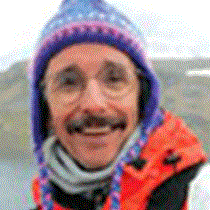At Sea in the Drake Passage
A strong following sea beats against our port stern as we make our way north. Behind us lies Antarctica, a different place from ten days before. Not as mysterious. Not as elusive either. More captivating and provocative than we imagined, with its penguins, whales and castles of ice. More difficult to put in words, given that our language evolves as we move away from wild places, not into them. Every year we add new words to our lexicon; words to frame our growing relationship with technology and cyberspace, yet no words to speak of open space; that tell of our place in the larger-than-human-world, how we fit into nature. How nature fits into us. How our hearts grow, and we feel a warmth in the cold, a closeness in the distance; how the conscience grows, and small voices tell us that the wilderness that used to be our parent is now our dependent.
We gather in the library to read, or in the lounge to visit with new friends; to study our photos on laptop computers, or stare out at the gray waves rolling by, the long-winged albatrosses banking over them. An atlas shows us Antarctica, opened to two pages. The white continent, the freezer at the bottom of the world. Soon autumn will come down here, and Antarctica will effectively double in size as a vast apron of sea ice encircles it. We’ll be back home then, basking in spring, and friends will ask, “How was Antarctica?” No words. Antarctica is what the world was, the ice age, everything pristine and new; brutal and beautiful, filled with mystery and magic. Thank goodness we are under no obligation to express the inexpressible.
A strong following sea beats against our port stern as we make our way north. Behind us lies Antarctica, a different place from ten days before. Not as mysterious. Not as elusive either. More captivating and provocative than we imagined, with its penguins, whales and castles of ice. More difficult to put in words, given that our language evolves as we move away from wild places, not into them. Every year we add new words to our lexicon; words to frame our growing relationship with technology and cyberspace, yet no words to speak of open space; that tell of our place in the larger-than-human-world, how we fit into nature. How nature fits into us. How our hearts grow, and we feel a warmth in the cold, a closeness in the distance; how the conscience grows, and small voices tell us that the wilderness that used to be our parent is now our dependent.
We gather in the library to read, or in the lounge to visit with new friends; to study our photos on laptop computers, or stare out at the gray waves rolling by, the long-winged albatrosses banking over them. An atlas shows us Antarctica, opened to two pages. The white continent, the freezer at the bottom of the world. Soon autumn will come down here, and Antarctica will effectively double in size as a vast apron of sea ice encircles it. We’ll be back home then, basking in spring, and friends will ask, “How was Antarctica?” No words. Antarctica is what the world was, the ice age, everything pristine and new; brutal and beautiful, filled with mystery and magic. Thank goodness we are under no obligation to express the inexpressible.




